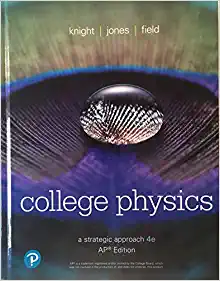Weve seen that bees develop a positive charge as they fly through the air. When a bee
Question:
We’ve seen that bees develop a positive charge as they fly through the air. When a bee lands on a flower, charge is transferred, and an opposite charge is induced in the earth below the flower. The flower and the ground together make a capacitor; a typical value is 0.80 pF. If a flower is charged to 30 V relative to the ground, a bee can reliably detect the added charge and then avoids the flower in favor of flowers that have not been recently visited. Approximately how much charge must a bee transfer to the flower to create a 30 V potential difference?
Fantastic news! We've Found the answer you've been seeking!
Step by Step Answer:
Related Book For 

College Physics A Strategic Approach
ISBN: 9780134779218
4th Edition
Authors: Randall D. Knight, Brian Jones
Question Posted:





